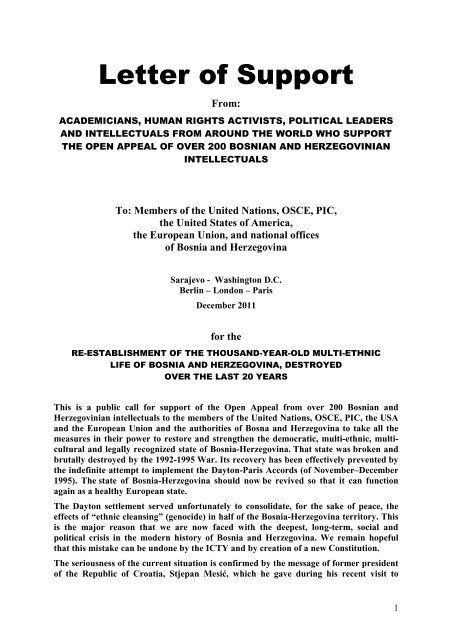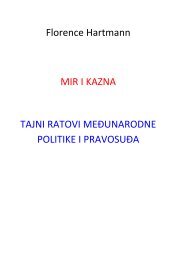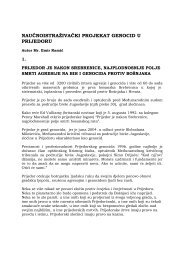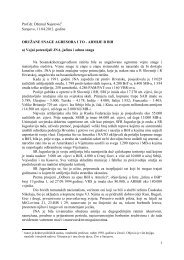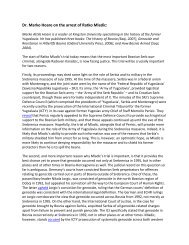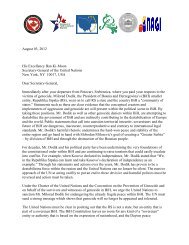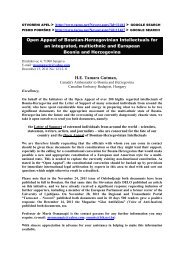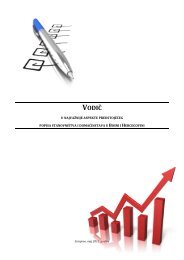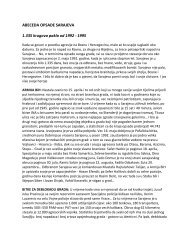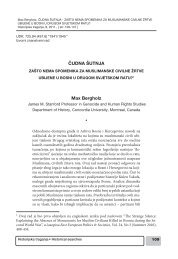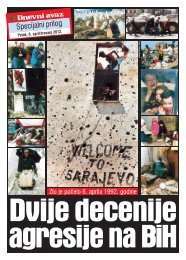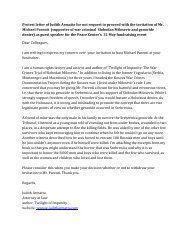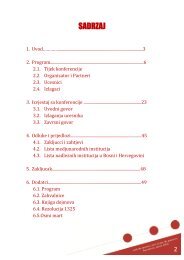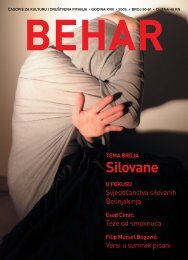Letter of Support from Intellectuals around the world - Institute For ...
Letter of Support from Intellectuals around the world - Institute For ...
Letter of Support from Intellectuals around the world - Institute For ...
You also want an ePaper? Increase the reach of your titles
YUMPU automatically turns print PDFs into web optimized ePapers that Google loves.
<strong>Letter</strong> <strong>of</strong> <strong>Support</strong><br />
From:<br />
ACADEMICIANS, HUMAN RIGHTS ACTIVISTS, POLITICAL LEADERS<br />
AND INTELLECTUALS FROM AROUND THE WORLD WHO SUPPORT<br />
THE OPEN APPEAL OF OVER 200 BOSNIAN AND HERZEGOVINIAN<br />
INTELLECTUALS<br />
To: Members <strong>of</strong> <strong>the</strong> United Nations, OSCE, PIC,<br />
<strong>the</strong> United States <strong>of</strong> America,<br />
<strong>the</strong> European Union, and national <strong>of</strong>fices<br />
<strong>of</strong> Bosnia and Herzegovina<br />
Sarajevo - Washington D.C.<br />
Berlin – London – Paris<br />
December 2011<br />
for <strong>the</strong><br />
RE-ESTABLISHMENT OF THE THOUSAND-YEAR-OLD MULTI-ETHNIC<br />
LIFE OF BOSNIA AND HERZEGOVINA, DESTROYED<br />
OVER THE LAST 20 YEARS<br />
This is a public call for support <strong>of</strong> <strong>the</strong> Open Appeal <strong>from</strong> over 200 Bosnian and<br />
Herzegovinian intellectuals to <strong>the</strong> members <strong>of</strong> <strong>the</strong> United Nations, OSCE, PIC, <strong>the</strong> USA<br />
and <strong>the</strong> European Union and <strong>the</strong> authorities <strong>of</strong> Bosna and Herzegovina to take all <strong>the</strong><br />
measures in <strong>the</strong>ir power to restore and streng<strong>the</strong>n <strong>the</strong> democratic, multi-ethnic, multicultural<br />
and legally recognized state <strong>of</strong> Bosnia-Herzegovina. That state was broken and<br />
brutally destroyed by <strong>the</strong> 1992-1995 War. Its recovery has been effectively prevented by<br />
<strong>the</strong> indefinite attempt to implement <strong>the</strong> Dayton-Paris Accords (<strong>of</strong> November–December<br />
1995). The state <strong>of</strong> Bosnia-Herzegovina should now be revived so that it can function<br />
again as a healthy European state.<br />
The Dayton settlement served unfortunately to consolidate, for <strong>the</strong> sake <strong>of</strong> peace, <strong>the</strong><br />
effects <strong>of</strong> “ethnic cleansing” (genocide) in half <strong>of</strong> <strong>the</strong> Bosnia-Herzegovina territory. This<br />
is <strong>the</strong> major reason that we are now faced with <strong>the</strong> deepest, long-term, social and<br />
political crisis in <strong>the</strong> modern history <strong>of</strong> Bosnia and Herzegovina. We remain hopeful<br />
that this mistake can be undone by <strong>the</strong> ICTY and by creation <strong>of</strong> a new Constitution.<br />
The seriousness <strong>of</strong> <strong>the</strong> current situation is confirmed by <strong>the</strong> message <strong>of</strong> former president<br />
<strong>of</strong> <strong>the</strong> Republic <strong>of</strong> Croatia, Stjepan Mesić, which he gave during his recent visit to<br />
1
neighboring Bosnia-Herzegovina. His warning to <strong>the</strong> international community was<br />
quoted in “Oslobodjenje” (17 march 2011):<br />
“The international community must discourage those who would destroy<br />
Bosnia-Herzegovina!”<br />
And what is <strong>the</strong> international community now doing? We cannot see anything<br />
substantial that has been undertaken to solve this problem. The primary problem is how<br />
to establish a new modern European Constitution for this multinational state, without<br />
<strong>the</strong> deeply negative effects <strong>of</strong> Dayton and <strong>the</strong> repetition <strong>of</strong> aggressive interference by <strong>the</strong><br />
neighboring states <strong>of</strong> Serbia and Croatia. Unless this problem is solved, <strong>the</strong>re is <strong>the</strong><br />
genuine risk that Bosnia and Herzegovina will be destroyed once again. We must transit<br />
to <strong>the</strong> capacity for a truly multiethnic democracy in Bosnia and Herzegovina. The Open<br />
Appeal explains how a genuine solution can be developed. <strong>For</strong> this reason, we – as<br />
concerned intellectuals and statesmen <strong>from</strong> <strong>around</strong> <strong>the</strong> <strong>world</strong> – give our strong support<br />
to <strong>the</strong> principles <strong>of</strong> <strong>the</strong> “Open Appeal” <strong>of</strong> <strong>the</strong> more than 200 intellectuals <strong>of</strong> Bosnia-<br />
Herzegovina who have signed this document.<br />
We, <strong>the</strong> undersigned <strong>of</strong> <strong>the</strong> <strong>Letter</strong> <strong>of</strong> <strong>Support</strong> have become aware <strong>of</strong> <strong>the</strong> Open Appeal<br />
<strong>from</strong> a substantial number <strong>of</strong> political leaders, academics, human rights activists, and<br />
intellectuals who recognize that <strong>the</strong> Dayton Peace Accords are no longer serving <strong>the</strong><br />
purpose <strong>of</strong> advancing <strong>the</strong> people <strong>of</strong> Bosnia and Herzegovina and assisting <strong>the</strong>m to<br />
become a democratic and free nation based upon <strong>the</strong> recognition <strong>of</strong> <strong>the</strong> equality and<br />
human dignity <strong>of</strong> all people.<br />
We support an urgent call for <strong>the</strong> Constitution given in <strong>the</strong> Dayton Peace Accords to be<br />
replaced by a Constitution based upon <strong>the</strong> Open Appeal principles.<br />
We also support a call to <strong>the</strong> United Nations, OSCE, PIC, USA and <strong>the</strong> European Union<br />
to convene a constitutional convention representing all <strong>of</strong> <strong>the</strong> people <strong>of</strong> Bosnia and<br />
Herzegovina in order to replace <strong>the</strong> Constitution <strong>from</strong> <strong>the</strong> Annex 4 <strong>of</strong> <strong>the</strong> Dayton Peace<br />
Accords with a Constitution based upon <strong>the</strong> aforesaid principles.<br />
Reviewers <strong>of</strong> <strong>the</strong> Justice Richard Goldstone<br />
text <strong>of</strong> <strong>the</strong> <strong>Letter</strong> Visiting Pr<strong>of</strong>essor <strong>of</strong> Law, Stanford Law School, CA, USA<br />
<strong>of</strong> <strong>Support</strong> The First Chief Prosecutor <strong>of</strong> ICTY who signed <strong>the</strong> indictment<br />
against Radovan Karadžić and Ratko Mladić (July 25, 1995)<br />
Academician Historian Noel Malcolm, PhD<br />
Fellow <strong>of</strong> British Academy, Oxford University, United Kingdom<br />
German Politician Christian Schwarz Schilling, PhD<br />
<strong>For</strong>mer High Representative for <strong>the</strong> B&H, Berlin, Germany<br />
H.E. Wolfgang Petritsch, PhD, Ambassador<br />
Permanent Delegation <strong>of</strong> Austria to <strong>the</strong> OECD, Paris, France<br />
<strong>For</strong>mer High Representative for B&H, Vienna, Austria<br />
Pr<strong>of</strong>essor Muris Osmanagić, PhD<br />
Coordinator <strong>of</strong> over 200 <strong>Intellectuals</strong>, Bosnia and Herzegovina<br />
2
The following list shows <strong>the</strong> names <strong>of</strong> over 70 individuals <strong>from</strong> various parts <strong>of</strong> <strong>the</strong> <strong>world</strong><br />
and various pr<strong>of</strong>essions: academics, scientists, human rights activists, political and public<br />
figures, writers, artists, and journalists, who have indicated <strong>the</strong>ir support for our proposal for<br />
a constitutional convention. With <strong>the</strong>ir knowledge <strong>of</strong> <strong>the</strong> past and present situation <strong>of</strong> Bosnia-<br />
Herzegovina and recognizing what has now become a planetary problem, <strong>the</strong>y have thus<br />
responded to <strong>the</strong> “Open Appeal” <strong>of</strong> more than 200 intellectuals <strong>of</strong> Bosnia-Herzegovina for<br />
a new constitution which meets modern European standards for a multi-national state.<br />
(alphabetically by last name)<br />
1. Academician Pr<strong>of</strong>essor Naim Hamdia Afgan, PhD, atomic physicist,<br />
Belgrade, Serbia. Emeritus pr<strong>of</strong>essor, UNESCO Chair Holder in Instituto Superior Tecnico,<br />
Lisbon, Portugal; Member <strong>of</strong> Academy <strong>of</strong> Science <strong>of</strong> Bosnia and Herzegovina, Sarajevo,;<br />
Fellow <strong>of</strong> Islamic Academy <strong>of</strong> Science, Amman, Jordan; Fellow <strong>of</strong> World Academy <strong>of</strong><br />
Science, Washington, USA.<br />
2. Pr<strong>of</strong>essor Karl Bahm, PhD. - Pr<strong>of</strong>essor <strong>of</strong> European History at <strong>the</strong> School<br />
Inquiry Department <strong>of</strong> <strong>the</strong> University Wisconsin-Superior, USA. He also co-leads <strong>the</strong> War<br />
and Peace in Bosnia study abroad every summer.<br />
3. Academician Pr<strong>of</strong>essor Ivo Banac, PhD is Bradford Durfee Emeritus<br />
Pr<strong>of</strong>essor <strong>of</strong> History at Yale University and Pr<strong>of</strong>essor <strong>of</strong> History at <strong>the</strong> University <strong>of</strong> Zagreb.<br />
He is a corresponding member <strong>of</strong> <strong>the</strong> Croatian Academy <strong>of</strong> Sciences and Arts (HAZU) and<br />
<strong>the</strong> past and current editor <strong>of</strong> East European Politics and Societies.<br />
4. Dragan Banjac, journalist, Serbia. Worked for many years as a journalist for <strong>the</strong><br />
Borba newspaper and a correspondent for Die Tageszeitung <strong>from</strong> Zurich.<br />
5. Mersad Berber, one <strong>of</strong> <strong>the</strong> best known artists <strong>of</strong> Bosnia-Herzegovina, who now<br />
lives (since 1992) in Zagreb, Croatia. His project entitled Srebrenica was opened to <strong>the</strong> public<br />
last year (2011), on <strong>the</strong> 12th <strong>of</strong> April at <strong>the</strong> Galerija Matice Hrvatske. The distinguished<br />
British <strong>the</strong>oretician <strong>of</strong> art, critic and curator Edward Lucie-Smith considers Berber to be<br />
among <strong>the</strong> greatest artists <strong>of</strong> <strong>the</strong> twentieth century.<br />
6. Pr<strong>of</strong>essor Jasmina Beširević-Regan, PhD, Dean <strong>of</strong> Trumbull College at Yale<br />
University. Her dissertation was concentrated on ethnic cleansing in <strong>the</strong> Bosnian city <strong>of</strong> Banja<br />
Luka.<br />
7. Sonja Biserko, Founder and President <strong>of</strong> <strong>the</strong> Helsinki Committee for Human<br />
Rights Serbia. She served as a diplomat for <strong>the</strong> former Yugoslavia in London and in <strong>the</strong><br />
United Nations at Geneva until 1991, when she resigned her diplomatic position in protest<br />
over <strong>the</strong> politics <strong>of</strong> Slobodan Milošević and his nationalist agenda <strong>of</strong> an “ethnically purified”<br />
Greater Serbia. Author and editor <strong>of</strong> several books about Serbian nationalism, among <strong>the</strong>m<br />
“Bosnia & Herzegovina - <strong>the</strong> Core <strong>of</strong> <strong>the</strong> Great Serbia Project”.<br />
8. Duško Bogdanović, CISA (Information System Auditor), CRISC (Risk &<br />
Information Systems Control), Director <strong>of</strong> <strong>the</strong> “Biljana Kovacevic Vuco” (BKV) Foundation,<br />
Belgrade, Serbia.<br />
9. Aleksandar Bošković, PhD, pr<strong>of</strong>essor <strong>of</strong> anthropology, Director <strong>of</strong> Research and<br />
Head <strong>of</strong> <strong>the</strong> Center for Political Research and Public Opinion in <strong>the</strong> <strong>Institute</strong> <strong>of</strong> Social<br />
Sciences in Belgrade.<br />
10. Ciga Božinović, journalist, Serbia, He has his own RTV performance.<br />
3
11. Michael Brand, MSc, elected to <strong>the</strong> German Federal Parliament in 2005,<br />
member <strong>of</strong> <strong>the</strong> Defense Commission, <strong>the</strong> Commission for Human Rights and Humanitarian<br />
Assistance, and <strong>the</strong> Parliamentary Assembly <strong>of</strong> NATO. In an article entitled “Getting Out <strong>of</strong><br />
Daytonstan” (Bosnia in Focus, 2010), he wrote: “Europe with <strong>the</strong> USA must reject <strong>the</strong> double<br />
standard and correct <strong>the</strong> fatal mistakes made in <strong>the</strong> Dayton Accords to <strong>the</strong> benefit <strong>of</strong> <strong>the</strong> war<br />
monger Milošević and o<strong>the</strong>r war criminals.”<br />
12. Miša Brkić, Serbian correspondent in Belgrade. Awarded <strong>the</strong> “Otpor Award” for<br />
courageous journalism during and after <strong>the</strong> dramatic events in October 2000 that led to <strong>the</strong><br />
end <strong>of</strong> Serbian President Milosevic’s government. (June 19, 2001 – The VOA – Voice <strong>of</strong><br />
America).<br />
13. Dr. Rory J. Conces, Associate Pr<strong>of</strong>essor <strong>of</strong> Philosophy and member <strong>of</strong> <strong>the</strong><br />
International Studies Faculty at Nebraska University, Omaha, USA. He is founding editor <strong>of</strong><br />
ID: International Dialogue, A Multi-Disciplinary Journal <strong>of</strong> World Affairs and a contributor<br />
to Bosnia Daily, an electronic newspaper in Sarajevo.<br />
14. Snežana Čongradin, Serbian journalist, researcher and member <strong>of</strong> <strong>the</strong><br />
International Consortium <strong>of</strong> Investigative Journalists, author <strong>of</strong> <strong>the</strong> article: “STOP politicians<br />
going to Potočare 11.07, if <strong>the</strong> Resolution on Srebrenica is not adopted”.<br />
15. Ivan Zvonimir Čičak, President <strong>of</strong> <strong>the</strong> Croatian Helsinki Committee for<br />
Human Rights (CHC) <strong>from</strong> 1993 to 1998 and again <strong>from</strong> 23 November 2009.<br />
16. Rajko Danilović, <strong>the</strong> Djindjic family attorney, Belgrade, Serbia.<br />
17. Pr<strong>of</strong>essor Ales Debeljak, PhD, poet and essayist, pr<strong>of</strong>essor at <strong>the</strong> School <strong>of</strong><br />
Social Sciences, University <strong>of</strong> Ljubljana, Slovenia.<br />
18. Miljenko Dereta graduated in Film and TV production, Faculty <strong>of</strong> Dramatic Arts<br />
Belgrade. Currently Executive Director <strong>of</strong> <strong>the</strong> Civil Initiatives Belgrade (FENS) and Co-<br />
Chairman <strong>of</strong> <strong>the</strong> Federation <strong>of</strong> Non-governmental Organisations <strong>of</strong> Serbia.<br />
19. Pavel Domonji, Chief <strong>of</strong> Staff, Office <strong>of</strong> <strong>the</strong> Ombudsman <strong>of</strong> Vojvodina, Republic<br />
<strong>of</strong> Serbia.<br />
20. Pr<strong>of</strong>essor Mirna Džamonja, PhD, University <strong>of</strong> Wisconsin – Madison, USA,<br />
full pr<strong>of</strong>essor at <strong>the</strong> School <strong>of</strong> Ma<strong>the</strong>matics, University <strong>of</strong> East Anglia, Norwich, United<br />
Kingdom.<br />
21. Mirko Djordjević, sociologist, writes regularly for <strong>the</strong> Belgrade independent<br />
fortnightly Republika. His motto is: 'Against <strong>the</strong> forces <strong>of</strong> fear, hatred and violence'. He made<br />
a report on a visit to Sarajevo to attend <strong>the</strong> third assembly <strong>of</strong> <strong>the</strong> Serb Civic Council (and <strong>the</strong><br />
first to be held in peacetime) entitled: Bosnia is Far Away, which appeared in Republika<br />
143-4 (July 1996).<br />
22. Tanja Fajon was elected to <strong>the</strong> European parliament in 2009. She is a Head <strong>of</strong> <strong>the</strong><br />
Slovenian delegation within <strong>the</strong> political group <strong>of</strong> Progressive Alliance <strong>of</strong> Socialists and<br />
Democrats.Tanja Fajon has been actively involved in <strong>the</strong> Western Balkan region. She is<br />
Vice-Chair <strong>of</strong> <strong>the</strong> Delegation to <strong>the</strong> EU-Croatia Joint Parliamentary Committee and substitute<br />
Member <strong>of</strong> <strong>the</strong> Delegation for relations with Albania, BIH, Serbia, Montenegro and Kosovo<br />
and was a rapporteur on <strong>the</strong> visa liberalisation process for <strong>the</strong> Western Balkans. Tanja is a<br />
full Member in <strong>the</strong> Committee on Civil Liberties, Justice and Home Affairs and active as a<br />
substitute Member in <strong>the</strong> Committee on <strong>For</strong>eign Affairs. Before political career Tanja worked<br />
as a journalist.<br />
4
23. Miroslav Filipović, Serbian journalist. Imprisoned in July 2000 for a series <strong>of</strong><br />
investigative articles over <strong>the</strong> Internet on atrocities by <strong>the</strong> Yugoslav forces.<br />
24. Pr<strong>of</strong>essor John V. A. Fine, PhD <strong>from</strong> Harvard University, Pr<strong>of</strong>essor <strong>of</strong> History<br />
at <strong>the</strong> University <strong>of</strong> Michigan, USA; his fields <strong>of</strong> study include Medieval and Modern Balkans<br />
and Byzantium. He has raised <strong>the</strong> understanding <strong>of</strong> Bosnian history, working tirelessly to<br />
correct popular misconceptions, especially during <strong>the</strong> Balkan wars <strong>of</strong> <strong>the</strong> 1990s.<br />
25. Pr<strong>of</strong>essor János Gyurok, PhD <strong>of</strong> sociology and politology at University <strong>of</strong> Pécs,<br />
Hungary, and a president <strong>of</strong> <strong>the</strong> Community <strong>of</strong> Catholic Citizens <strong>of</strong> Bosnian Origin in<br />
Hungary.<br />
26. Academician Pr<strong>of</strong>essor Mirsad Hadžikadić, PhD <strong>from</strong> Sou<strong>the</strong>rn Methodist<br />
University, Dallas, Texas. Dean <strong>of</strong> <strong>the</strong> Faculty for Computer Sciences and Informatics,<br />
University <strong>of</strong> North Carolina, Charlotte, USA; Founder and President <strong>of</strong> <strong>the</strong> Bosnian-<br />
Herzegovinian and American Academy <strong>of</strong> Sciences and Arts (2007). In 2005 he was <strong>the</strong><br />
recipient <strong>of</strong> one <strong>of</strong> <strong>the</strong> highest awards for Life Achievement in Information Technology, <strong>the</strong><br />
“Blue Diamond Awards.”<br />
27. Academician Pr<strong>of</strong>. Kemal Hanjalić, PhD, Pr<strong>of</strong>essor at Delft University,<br />
Ne<strong>the</strong>rlands, Member <strong>of</strong> ANUBiH, and a former Minister <strong>of</strong> Science <strong>of</strong> Bosnia and<br />
Herzegovina.<br />
28. Florence Hartmann, writer, former journalist <strong>of</strong> Paris “Le Monde”, former war<br />
correspondent in <strong>the</strong> Balkans, advisor to <strong>the</strong> chief prosecutor <strong>of</strong> <strong>the</strong> ICTY and ICTR, and <strong>the</strong><br />
war crimes court's <strong>of</strong>ficial spokeswoman for six years (2000-2006). She wrote a book, Peace<br />
and Punishment (2007), where she criticized <strong>the</strong> ICTY’s confidential agreement with Serbia<br />
to conceal material evidence <strong>of</strong> Serbia's direct involvement in <strong>the</strong> genocide in Bosnia during<br />
<strong>the</strong> 1992-95 war.<br />
29. Marko Attila Hoare, PhD <strong>from</strong> Yale University, USA, British historian at<br />
Kingston University London, Faculty <strong>of</strong> Arts and Social Sciences, specialising in <strong>the</strong> history<br />
<strong>of</strong> Sou<strong>the</strong>ast Europe, in particular <strong>of</strong> Yugoslavia, Serbia and Bosnia-Herzegovina. He has<br />
published <strong>the</strong> books: The History <strong>of</strong> Bosnia – <strong>from</strong> <strong>the</strong> Middle Ages to <strong>the</strong> Present Day<br />
(London Saqi Books, 2007); Genocide and Resistence in Hitler's Bosnia, <strong>the</strong> Partisans and<br />
<strong>the</strong> Chetniks, 1941-1943 (London: Oxford University Press, 2006); and How Bosnia Armed<br />
(London: Saqi Books, 2004). Dr Hoare was a war-crimes investigator at <strong>the</strong> International<br />
Tribunal for <strong>the</strong> former Yugoslavia (ICTY).<br />
30. Pr<strong>of</strong>essor Adnan Ibrahimbegović, PhD, (University <strong>of</strong> California, Berkeley),<br />
University École Normale Supérieure-Cachan in France. In 2009 he was <strong>the</strong> recipient <strong>of</strong> <strong>the</strong><br />
Awards <strong>of</strong> university pr<strong>of</strong>essors in France: ‘Classe Exceptionnelle’. He has published 352<br />
scientific articles and papers.<br />
31. Borislav Jovanović, Montenegrin writer, poet, author, essayist and literary critic,<br />
and an influential columnist for <strong>the</strong> daily newspaper “Pobjeda”. He was an active participant<br />
in <strong>the</strong> public struggle for constitutional recognition <strong>of</strong> <strong>the</strong> Montenegrin language as <strong>the</strong><br />
mo<strong>the</strong>r tongue <strong>of</strong> Montenegrins. He is a member <strong>of</strong> <strong>the</strong> Montenegrin Society <strong>of</strong> Independent<br />
Writers and Matica Crnogorska.<br />
32. Jelko Kacin, Slovenian politician and Member <strong>of</strong> <strong>the</strong> European Parliament, sits on<br />
<strong>the</strong> European Parliament's Committee on <strong>For</strong>eign Affairs. Kacin has stressed that “Republika<br />
Srpska”, Bosnia's predominantly Serb entity, is facing bankruptcy, so <strong>the</strong> recent referendum<br />
on cooperation with <strong>the</strong> state court is a maneuver to distract and divert <strong>the</strong> attention <strong>of</strong> <strong>the</strong><br />
5
public with fictions and illusions, “such as <strong>the</strong> idea that <strong>the</strong> entity could separate <strong>from</strong><br />
Bosnia.”<br />
33. Tamara Kaliterna, journalist, Belgrade, Serbia. From 1996 she worked as editor<br />
in <strong>the</strong> opposition daily “Danas” and regularly contributes to o<strong>the</strong>r monthly and weekly<br />
journals throughout <strong>the</strong> Balkans.<br />
34. Branka Kaljević, Office <strong>of</strong> <strong>the</strong> Ombudsman <strong>of</strong> Serbia.<br />
35. Pr<strong>of</strong>essor Žarko Korać, PhD, psychologist and politician, is one <strong>of</strong> <strong>the</strong><br />
founders and president <strong>of</strong> <strong>the</strong> Social Democratic Union. He was Deputy Prime Minister in<br />
<strong>the</strong> government <strong>of</strong> Serbia between 2001 and 2003, and briefly acting Prime Minister (17-18<br />
March 2003), after Zoran Djindjic was assassinated. He is now a member <strong>of</strong> <strong>the</strong> Parliament <strong>of</strong><br />
Serbia as part <strong>of</strong> <strong>the</strong> LDP-led coalition. He has published several scientific books.<br />
36. Academician Dr. Noel Malcolm, British historian, Fellow <strong>of</strong> <strong>the</strong> British<br />
Academy; Senior Research Fellow, All Souls College, Oxford University. In his accurate and<br />
concise “Bosnia: A Short History”, which covered fairly and objectively 1000 years <strong>of</strong><br />
Bosnia’s history, we can read that “ethnic cleansing” [genocide] is not a by-product <strong>of</strong> <strong>the</strong><br />
war [1992-1995] but a central element in <strong>the</strong> Serbian goal <strong>of</strong> creating homogeneous Serb<br />
enclaves that eventually will join toge<strong>the</strong>r in a greater Serbia.” In analyses published after<br />
<strong>the</strong> end <strong>of</strong> <strong>the</strong> war he pointed out that <strong>the</strong> primary consequence <strong>of</strong> <strong>the</strong> Dayton<br />
settlement was to consolidate <strong>the</strong> effects <strong>of</strong> ethnic cleansing.<br />
37. Pr<strong>of</strong>essor Predrag Matvejević, PhD <strong>of</strong> Literature and Es<strong>the</strong>tics (<strong>the</strong><br />
Sorbonne University, Paris). Full Pr<strong>of</strong>essor at <strong>the</strong> University La Sapienza <strong>of</strong> Rome. He is<br />
one <strong>of</strong> <strong>the</strong> best-known Bosnian-Croatian intellectuals, but is now a naturalised Italian citizen.<br />
He has published more than sixty books in Croatian, French and Italian.<br />
38. Stjepan Mesić, President <strong>of</strong> <strong>the</strong> Republic <strong>of</strong> Croatia 2000–2010. In opposition and<br />
in contrast to Tudjman's personality and general politics, including negative policies directed<br />
against Bosnia and Herzegovina, Stjepan Mesic was, over <strong>the</strong> last ten years, repeatedly voted<br />
<strong>the</strong> most popular politician in Croatia. In an interview granted to <strong>the</strong> “Free Europe” (June 30,<br />
2011) in answer to a question about a possible third Entity, he said: “If <strong>the</strong> Croats were to get<br />
an entity, that would be <strong>the</strong> end <strong>of</strong> Croats in Bosnia and Herzegovina.”<br />
39. Dusan Mijić, LDP Vice President, Belgrade, Serbia. The LDP although still a<br />
young party has made great advances in recent years, and through a system <strong>of</strong> proportional<br />
representation, <strong>the</strong>y now have 14 MPs in <strong>the</strong> Serbian parliament. Now that a stable coalition<br />
has been formed in Serbia, <strong>the</strong> LDP see this as an ideal opportunity to develop a distinct and<br />
relevant set <strong>of</strong> policies. (Liberal Democrats, January 20, 2009).<br />
40. Lula Mikijelj, film artist, Belgrade, Serbia.<br />
41. Ivan Mrđan, journalist, former editor-in-chief <strong>of</strong> <strong>the</strong> independent “Nasa Borba”<br />
and <strong>the</strong> current editor <strong>of</strong> <strong>the</strong> independent “Blic Belgrade”. He completed <strong>the</strong> research for<br />
“Who owns Serbia” (Blic, June 19, 2011).<br />
42. Doris Gisela Pack, German politician, Chairperson <strong>of</strong> <strong>the</strong> Committee on Culture<br />
and Education <strong>of</strong> <strong>the</strong> European Parliament. At <strong>the</strong> international conference “Europe 2020 –<br />
Civic Visions”, in S<strong>of</strong>ia, Bulgaria, January 30, 2010, Mrs. Doris Pack said: “The soul <strong>of</strong><br />
Europe is culture ... We should keep in mind that <strong>the</strong> EU is <strong>the</strong> only guarantee for preserving<br />
<strong>the</strong> different cultural identities, and this means that <strong>the</strong>re is not one European Culture, <strong>the</strong>re<br />
are thousands <strong>of</strong> European Cultures and each deserves to be kept.”<br />
6
43. Te<strong>of</strong>il Pančić, journalist, columnist and literary critic writing for <strong>the</strong> independent<br />
weekly magazine “Vreme”. He was assaulted in Belgrade on a Saturday night, on a public bus,<br />
by two masked attackers, wielding a 1,0 m metal pipe and was hospitalized... (as reported in<br />
Balkan Insight, July 26, 2010)<br />
44. Ljiljana Palibrk, Member <strong>of</strong> Helsinki Committee for Human Rights Serbia.<br />
Served as moderator <strong>of</strong> <strong>the</strong> panel discussion, with support <strong>from</strong> Heinrich Böll Stiftung, in <strong>the</strong><br />
project entitled "Europe, Why Not?" (in <strong>the</strong> pre-election period <strong>of</strong> April and May 2008).<br />
45. Borka Pavičević, studied Theatre in Belgrade and influenced <strong>the</strong> Yugoslav <strong>the</strong>atre<br />
scene as an avant-garde director and dramatist. In 1994, she founded <strong>the</strong> Centre for Cultural<br />
Decontamination to work against nationalism, intolerance and xenophobia. In addition, she<br />
works as a columnist for several Serbian newspapers and magazines.<br />
46. Dr. Latinka Perović, Serbian historian, former politician, graduated in philology<br />
and political science at <strong>the</strong> University <strong>of</strong> Belgrade. At age 27, she was already president <strong>of</strong><br />
<strong>the</strong> Women’s Antifascist Front <strong>of</strong> Serbia. She was Chief Secretary <strong>of</strong> <strong>the</strong> Communist Party <strong>of</strong><br />
Serbia <strong>from</strong> 1968 to 1972, but in 1972 she was removed <strong>from</strong> this position because her views<br />
were considered too liberal. After that, she devoted herself to historical research, working<br />
1976-1998 at <strong>the</strong> <strong>Institute</strong> for Recent History <strong>of</strong> Serbia. Considered by many to be <strong>the</strong> founder<br />
<strong>of</strong> modern liberalism in Serbia, in Kikinda, Vojvodina (April 2010), she stated: “Eight<br />
thousand people were killed in Srebrenica in three days only. The executioners must have<br />
had logistic support, grave diggers, machinery and people who cleansed <strong>the</strong> terrain after <strong>the</strong><br />
massacre. This was indisputably an operation planned well in advance.” The audience<br />
applauded her words.<br />
47. Vesna Pešić, member <strong>of</strong> Parliament <strong>of</strong> Serbia since 2007 and senior scientific<br />
associate <strong>of</strong> <strong>the</strong> <strong>Institute</strong> <strong>of</strong> Philosophy and Social Theory in Belgrade, served as Ambassador<br />
to Mexico <strong>from</strong> 2001 to 2005. A founding member <strong>of</strong> <strong>the</strong> Yugoslav Helsinki Committee<br />
(1985), <strong>the</strong> Association for <strong>the</strong> Yugoslav Democratic Initiative (1989), <strong>the</strong> Yugoslav<br />
European Movement (1991) and <strong>the</strong> Centre for Antiwar Action (1991), 1992-1999 she was<br />
<strong>the</strong> president <strong>of</strong> <strong>the</strong> Civic Alliance <strong>of</strong> Serbia, and 1993-1997 one <strong>of</strong> <strong>the</strong> leaders <strong>of</strong> <strong>the</strong><br />
Coalition Zajedno (Toge<strong>the</strong>r), (with Zoran Djindjic's Democratic Party).<br />
48. Dr. Wolfgang Petritsch, Ambassador, Permanent Delegation <strong>of</strong> Austria to <strong>the</strong><br />
OECD, Paris, France. From 1999 to 2002 he was <strong>the</strong> High Representative for Bosnia and<br />
Herzegovina. In <strong>the</strong> book“Bosnien im Focus” (2010) he writes: “Mistaken decisions with farreaching<br />
consequences were made for war-torn Bosnia-Herzegovina ... when America in <strong>the</strong><br />
summer <strong>of</strong> 1995, at <strong>the</strong> behest <strong>of</strong> <strong>the</strong>ir special envoy Richard Holbrooke, stopped <strong>the</strong> Bosniak<br />
progress towards Banja Luka, <strong>the</strong> capital <strong>of</strong> <strong>the</strong> Bosnian-Serb republic.”<br />
49. Bojan Al Pinto, journalist <strong>of</strong> <strong>the</strong> magazine “Republika”, Belgrade, Serbia. Their<br />
capital work is “Serbian Road to War”, translated into English, French, and German, and<br />
parts <strong>of</strong> which have been published in Italian, Russian and Greek. The journalists <strong>of</strong><br />
“Republika” have not accepted <strong>the</strong> final triumph <strong>of</strong> Evil. The struggle for freedom and<br />
democracy continues, this time through lobbying for elections for a constitutional assembly.<br />
50. Academician Pr<strong>of</strong>. Joze Pirjevec, PhD, is both an Italian and Slovenian<br />
citizen, a prominent Slovene diplomatic historian <strong>of</strong> <strong>the</strong> west Balkans region, and a member<br />
<strong>of</strong> <strong>the</strong> Slovenian Academy <strong>of</strong> Sciences and Arts. He has taught history <strong>of</strong> Eastern Europe at<br />
<strong>the</strong> universities <strong>of</strong> Pisa, Trieste and Padova. Currently he is <strong>the</strong> head <strong>of</strong> <strong>the</strong> history department<br />
at <strong>the</strong> University Primorska in Koper.<br />
7
51. Aleksandar Popov, Executive Director <strong>of</strong> “Civil Initiative Serbia” and Director <strong>of</strong><br />
<strong>the</strong> Centre for Regionalism, Novi Sad, Vojvodina. Also Co-President <strong>of</strong> <strong>the</strong> Association <strong>of</strong><br />
“<strong>the</strong> Igman Initiative”. He asserts that taken toge<strong>the</strong>r, managing multiethnic cities in<br />
sou<strong>the</strong>astern Europe <strong>of</strong>fers a way to channel enthusiasm for peace and democracy.<br />
52. Judita Popović, attorney in Zrenjanin, Vojvodina, and LDP member <strong>of</strong> <strong>the</strong> Serbian<br />
Parliament.<br />
53. Pr<strong>of</strong>essor Nenad Prokić, PhD, LDP member <strong>of</strong> <strong>the</strong> Serbian Parliament,<br />
playwright, <strong>the</strong>atre director, member <strong>of</strong> <strong>the</strong> Presidency and founder <strong>of</strong> <strong>the</strong> Liberal Democratic<br />
Party. A pr<strong>of</strong>essor <strong>of</strong> 20th Century Drama (University <strong>of</strong> Art in Belgrade, Serbia), he was <strong>the</strong><br />
playwright-in-residence at <strong>the</strong> Yugoslav Drama Theatre in Belgrade and Slovenian National<br />
Theatre in Maribor. He served as General Manager <strong>of</strong> Belgrade International Theatre Festival<br />
(BITEF) in two consecutive mandates.<br />
54. Academician Pr<strong>of</strong>essor Zoran Salčić, PhD, (University <strong>of</strong> Sarajevo, Bosnia<br />
and Herzegovina). Pr<strong>of</strong>essor <strong>of</strong> Computer Systems Engineering, <strong>the</strong> University <strong>of</strong> Auckland,<br />
New Zealand, Pr<strong>of</strong>essor Salčić is a member <strong>of</strong> <strong>the</strong> New Zealand Academy <strong>of</strong> Science (Fellow<br />
Royal Society New Zealand). He has published more than 250 scientific papers and seven<br />
books.<br />
55. Pr<strong>of</strong>essor Nikola Samardjić, PhD, Department <strong>of</strong> History, Early Modern and<br />
Modern History Chairman, Faculty <strong>of</strong> Philosophy, Belgrade University; Member <strong>of</strong> New<br />
Balkan <strong>Institute</strong>, Serbia. In an interview with journalist, Snezana Congradin<br />
(http://www.tacno.net/23May2011 pr<strong>of</strong>essor Samardžić pointed out that in this most recent<br />
decade “Europe has allowed Serbia and Republika Srpska to continue its racist propaganda<br />
which has supported ethnocentrism, produced cultural differences, and emphasized <strong>the</strong><br />
heritage <strong>of</strong> all <strong>the</strong> extreme ideologies <strong>of</strong> <strong>the</strong> previous century. Even after <strong>the</strong> year 2000 <strong>the</strong><br />
E.U. has shown excessive trust towards Beograd and Banja Luka. Thus it has permitted <strong>the</strong><br />
renewal <strong>of</strong> <strong>the</strong> message and basic logic <strong>of</strong> war-mongering politics. This logic dominates <strong>the</strong><br />
Serbian media, schools and universities, sports stadiums and church pulpits. Thus a continuity<br />
is created with <strong>the</strong> politics <strong>of</strong> Milosevic, with <strong>the</strong> cultivating <strong>of</strong> <strong>the</strong> most disgusting<br />
personalities and phenomena <strong>of</strong> that time, along with alternatives which <strong>of</strong>fer more<br />
nationalism, more communism, more clericalism, more evil and poverty. ...<br />
56. Dr. Christian Schwarz Schilling, German Politician, former Minister for Post<br />
and Telecommunications (1982-1992), served as International Mediator in BiH (1994-2004)<br />
and as <strong>the</strong> High Representative for BiH (31 January 2006 – 02 July 2007). The latest article<br />
<strong>from</strong> Dr. Schwarz Schilling, printed in “L'Europe en <strong>For</strong>mation”, automne 2010, No 357<br />
was: “The Ejup Ganic Case - How Serbia Attempted to Manipulate <strong>the</strong> British Justice<br />
System.”<br />
57. Pr<strong>of</strong>essor Boris Sket, PhD, corresponding member <strong>of</strong> SAZU – Slovenian<br />
Academy <strong>of</strong> Sciences and Arts, <strong>For</strong>eign member <strong>of</strong> ANUBiH, and a former Rector <strong>of</strong> <strong>the</strong><br />
University Ljubljana, Slovenia. Pr<strong>of</strong>essor <strong>of</strong> Zoology and Speleobiology at Biotehniška<br />
fakulteta, Oddelek za biologijo, Univerza v Ljubljani .<br />
58. Biljana Srbljanović, writer and journalist, playwright. Member <strong>of</strong> LDP and <strong>the</strong>ir<br />
candidate for mayor <strong>of</strong> Belgrade 2008. A prominent figure in Serbian public life, she is<br />
known for frequently speaking about “<strong>the</strong> irresponsibility <strong>of</strong> <strong>the</strong> political elite in Serbia”,<br />
“Serbian violent nationalism”, and “<strong>the</strong> culture <strong>of</strong> violence and exclusion in Serbian daily<br />
life”. Her play, Skakavci (Locusts), won one <strong>of</strong> Europe's most prominent <strong>the</strong>atre awards.<br />
8
59. Seška Stanojlović, journalist and editor-in-chief <strong>of</strong> <strong>the</strong> “Helsinki Charter<br />
Magazine”. In Kikinda, Vojvodina (April 2010), as part <strong>of</strong> <strong>the</strong> Helsinki Committee for<br />
Human Rights in Serbia toge<strong>the</strong>r with <strong>the</strong> historian Latinka Perovic, she promoted <strong>the</strong> project<br />
“The Balkans and European Challenges”.<br />
60. Branimir Stojanović, with a degree in philosophy <strong>from</strong> Belgrade University, has<br />
published numerous articles on contemporary philosophy, psychoanalytic <strong>the</strong>ory, critique <strong>of</strong><br />
ideology and art <strong>the</strong>ory.<br />
61. Pr<strong>of</strong>essor Asif Šabanović, PhD (University <strong>of</strong> Sarajevo), Pr<strong>of</strong>essor <strong>of</strong> Sabanci<br />
University, Istanbul, Turkey and Pr<strong>of</strong>essor <strong>of</strong> Keio University, Japan. Dr. Šabanović was<br />
visiting pr<strong>of</strong>essor at many universities: CalTech, USA; Keio University, Japan; Yamaguchi<br />
University, Japan; Marmara Research Center, Turkey. Currently he is Head <strong>of</strong> <strong>the</strong> Department<br />
CAD/CAM, Sabanci University Mechatronics Program, Turkey.<br />
62. Predrag Šarapa, journalist and editor in <strong>the</strong> well-known RTV Studio B, Belgrade,<br />
Serbia, and author <strong>of</strong> its popular program “Problems”.<br />
63. Pr<strong>of</strong>essor Šemso Tanković, PhD, <strong>of</strong> University <strong>of</strong> Zagreb, president <strong>of</strong> <strong>the</strong><br />
Party <strong>of</strong> Democratic Action Croatia (SDAH). In an interview for “Oslobodjenje” (14 April<br />
2011), when asked for his opinion on <strong>the</strong> current policies <strong>of</strong> Croatia towards Bosnia-<br />
Herzegovina, he said: “I think those policies are bad… I will be working to get a united<br />
Bosnia-Herzegovina, without entities.”<br />
64. Bojan Tončić, Serbian journalist <strong>of</strong> <strong>the</strong> daily paper, “Danas”, since its founding,<br />
and one <strong>of</strong> <strong>the</strong> founders and editors <strong>of</strong> <strong>the</strong> publication “Prava čoveka” (The Rights <strong>of</strong> Man),<br />
writes about war crimes, <strong>the</strong>ir causes, perpetrators, <strong>the</strong> social atmosphere and legal<br />
consequences <strong>of</strong> war crimes.<br />
65. Dragoljub Todorović, attorney for political victims, Belgrade, Serbia, he<br />
participated (2009) in preparing <strong>the</strong> report: “Political media-related and legal analysis <strong>of</strong> <strong>the</strong><br />
cases <strong>of</strong> RTS, Topčider and Leskovac.”<br />
66. Milica Tomić, visual artist, lives and works in Belgrade and Vienna. Her work<br />
centres on issues <strong>of</strong> political violence, nationality and identity with particular attention to <strong>the</strong><br />
tensions between personal experience and media constructed images.<br />
67. Ivan Torov, journalist and analyst, Belgrade, Serbia, has warned (31 st May 2010)<br />
that Western leaders must act quickly to avert a new Balkan disaster, by putting pressure on<br />
Greece to lift its veto on Macedonia's EU and NATO membership.<br />
68. Goran Vojnovič, a promising young Slovenian writer and director <strong>of</strong> production in<br />
movie arts. His recent film, Pirano-Pirano, premiered at International Film Durres, August-<br />
September 2011.<br />
69. Pr<strong>of</strong>essor Dr Milan Vukomanović, Department <strong>of</strong> Sociology, University <strong>of</strong><br />
Belgrade, received his PhD in 1993 at <strong>the</strong> University <strong>of</strong> Pittsburgh, where he taught social<br />
history <strong>of</strong> Early Christianity and Orthodox Christianity until 1995. He is co-founder <strong>of</strong> <strong>the</strong><br />
Center for Religious Studies, Belgrade Open School. He is also <strong>the</strong> current president <strong>of</strong> <strong>the</strong><br />
Sociological Association <strong>of</strong> Serbia and Montenegro and co-founder and member <strong>of</strong> <strong>the</strong><br />
management board <strong>of</strong> <strong>the</strong> Center for Democracy Foundation.<br />
70. Tomislav Žigmanov, journalist, Subotica, Vojvodina. On May 9th 2002, at <strong>the</strong><br />
roundtable discussion entitled ‘Fascism and Neo-Fascism Today: Serbia’, in <strong>the</strong> panel<br />
discussion about <strong>the</strong> situation in Subotica, he noted: “Religious sites have been bombed. The<br />
9
SRS (Serbian Radical Party) and SSJ (Serbian Unity Party) propagate ethnocentrism. The<br />
ethnic picture is changing but <strong>the</strong>re still exists a hidden ethnic dimension.”<br />
71. Tilman Zülch, General Secretary and President <strong>of</strong> <strong>the</strong> Society for Threatened<br />
Peoples – International, writer and editor for a number <strong>of</strong> publications on problems <strong>of</strong><br />
nationalism and war crimes. In his contribution to <strong>the</strong> book “Bosnia in Focus” he quotes <strong>the</strong><br />
words <strong>of</strong> Marek Edelman, <strong>the</strong> last surviving commander <strong>of</strong> <strong>the</strong> Warsaw Ghetto resistance,<br />
who said: “Europe has learned nothing <strong>from</strong> <strong>the</strong> holocaust... What happened in Bosnia-<br />
Herzegovina amounts to Hitler’s posthumous victory.”<br />
72. Staša Zajović, Coordinator, WOMEN IN BLACK Belgrade, Serbia; diploma <strong>of</strong> <strong>the</strong><br />
Faculty <strong>of</strong> Philology, University Belgrade (1976). Activist for peace, organizer and<br />
participant <strong>of</strong> numerous anti-militaristic, peaceful, feminist actions, performances,<br />
conferences, seminars (more than one thousand), and meetings. She is <strong>the</strong> recipient <strong>of</strong> <strong>the</strong><br />
Millennium Award for Peace UNIFEM, 2001.<br />
women in black – Belgrade<br />
WE REMEMBER SARAJEVO<br />
The marking <strong>of</strong> seventy years since <strong>the</strong> Nazi bombardment <strong>of</strong> Belgrade, one <strong>of</strong> <strong>the</strong> most<br />
tragic events in <strong>the</strong> recent history <strong>of</strong> this city, passed in <strong>the</strong> proverbial chauvinistic<br />
oblivion and absence <strong>of</strong> sympathy with <strong>the</strong> citizens <strong>of</strong> Sarajevo, <strong>the</strong> victims <strong>of</strong> <strong>the</strong><br />
Belgrade shells fired <strong>from</strong> Pale. Not a single part <strong>of</strong> <strong>the</strong> state or national media made<br />
mention <strong>of</strong> <strong>the</strong> fact that 06 April was <strong>the</strong> day <strong>of</strong> <strong>the</strong>se two terrible anniversaries.<br />
After a full 19 years, we remember: <strong>the</strong> Aggression against Sarajevo and Bosnia and<br />
Herzegovina started on 06 April 1992, and over <strong>the</strong> next 1425 days in Sarajevo <strong>the</strong>re<br />
were over 11,000 people killed, including 1,601 children. The Sarajevo siege by Serbian<br />
powers, paid for and supported by Belgrade, was <strong>the</strong> longest in <strong>the</strong> history <strong>of</strong> modern<br />
warfare. During this time an average <strong>of</strong> 329 shells per day were fired on Sarajevo, with a<br />
record number <strong>of</strong> 3,777 shells registered July 22, 1993.<br />
The State <strong>of</strong> Serbia has not confronted its own past. In fact, a new generation <strong>of</strong> youth<br />
are growing up without any knowledge <strong>of</strong> <strong>the</strong> state-sponsored war crimes, coming <strong>from</strong><br />
an ideology with headquarters based in Belgrade.<br />
We believe and demand that all war crimes which have been made in our name and<br />
<strong>from</strong> our land should be punished and should never be forgotten.<br />
Women in Black Belgrade April 06, 2011<br />
10


